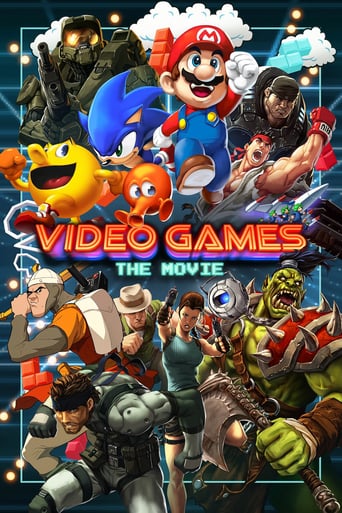Steve Pulaski
To say that Video Games: The Movie bites off more than it can chew is an understatement; if it wasn't about to create ten two-hour long parts for a miniseries dealing with the complete history of video games, its mouth was never going to even remotely sustain what was trying to be forced into it. Director Jeremy Snead states that over forty-five hours of footage for the documentary was shot and he plans to put the footage to a sequel documentary or future Television projects because video games are "something that deserves more treatment in film and Television." I couldn't agree more, and Video Games: The Movie is a marginally effective starting point to get someone contemplating and, most importantly, recognizing the foundation in which their favorite games were expanded upon. The downside, however, is that this documentary isn't structurally sound, jumping back and forth from cherrypicking and analyzing the capabilities of a select few consoles before doubling back to try and create some kind of oral history, again, taking from random events.The film, in the beginning, attempts to assess a select few video game consoles, like the Atari 2600, the Nintendo Entertainment System, the Super Nintendo, and the PlayStation. During this time, we skip over generational conflicts and significant consoles, like the Sega Genesis, the Sega Dreamcast, more inventive and obscure systems like the Neo-Geo, Turbo-Grafx 16, and the Sega Game Gear, and the famed "bit wars." I have little doubt that Snead has footage on hard drives pertaining to these consoles and these features, but the documentary moves in a way that seemingly neglects their very existence. This is one of the many problems with tackling a broad subject in a broad manner.After we reach the Xbox 360 and the PlayStation 3, only briefly mentioning the revolutionary qualities of the Nintendo Wii, we double all the way back to try and pinpoint who to credit with the foundation of video games. Do we credit Nolan Bushnell, the co-founder of Atari, who provided the first in-home gaming experience in the 1970's? Steve Russell, who created the first interactive computer game on the PDP-I by the name of Space War at MIT in the 1960's? Or do we credit the 1950's invention where light rays and magnifying glasses were used to create an even more primitive version of Pong known as Tennis for Two? Following that debate, we return to the jumbled timeline of events by working our way to the present starting with the video game crash of 1983, where video games were desperately close to becoming a fad. Following the crash, it was said that many people were tired of video games, yet a solid amount of people wanted to continue playing. This would eventually lead to Nintendo and Sega rising from Atari and Intellevision's ashes to bring about an entirely different gaming experience that was never before seen.The amount of people in Video Games: The Movie is pretty astonishing, as many of them hail from different companies, bear different titles, and have worked on a plethora of different projects. With that, each one offers a unique perspective, or at least one well worth digesting and analyzing. One of the most talkative and fascinating souls in the film is Cliff Bleszinski, known for creating the Gears of War video game series. He talks about the creation of games in a way that breaks down the multitude and complexity of the moving parts that go into creating a game's story, rendering the graphics, writing and composing a score, and so forth, concluding it's like "The Avengers of talent" on display with every new video game and video games being the culmination of art forms like no other piece of art out there. He describes their significance by saying they exist as a "lean forward experience" rather than a "lean back experience" or the same experience you get when watching a film. Like reading a book, if you choose to remain idle in a game, the story doesn't continue. A film keeps on playing until an audience picks up the remote and commands what it wants it to do.These kind of perspectives and philosophy breaking video games from the often oversimplified confines of ignorant opinions and vast generalizations keep the documentary afloat and moving. The way it humanizes gaming culture shows a true love and appreciation on part of Snead and his giant crew, with John Sharp stating that video games provide people with a safe place to fail and problem solve, two things that are greatly intimidating and a product of our fear in the real world. In addition, another woman states that gamers look to games as a means to fit in and be accepted since they often feel left out in the real world. Unlike in social cliques, social settings, or other environments, in video games, we're always welcome and always fit in.This hominess provides Video Games: The Movie with a pleasant sense of seriousness, even if the film keeps making the grave mistake of doubling back on its timeline. As mean as this is to say, this was a documentary that simply couldn't be as effective as it needed to be from the start. The area of video games is far, far too broad and complex for one documentary to sustain all, if most, of its core areas of information and fact. The film is amiable enough, sure to provide audiences, including myself, with warm, fuzzy feelings of nostalgia and constant grins provoked by basically watching old memories, emotions, and feelings come to life on the screen, however, far too scattershot to warrant a recommendation. This one gets more like a wink and an the movement of a hand in the "so-so/more or less" manner.Directed by: Jeremy Snead.
Ryan_MYeah
On the one hand, I love the film's concepts fine. Video games are an incredible medium (one that outshines even cinema) with such fascinating history behind them, and the evolution of the gaming business and community on screen is quite wonderful. It says something about what a great artform it is that it brings so many people from different walks of life together, and even goes so far as to create lasting friendships and marriages. We may not realize, but sometimes, those seemingly insignificant connections we have create all the difference in the world. However, that's the extant of the film's great qualities, and the overall film is not as interesting, or too engaging to the uninitiated. The film is built firmly on nostalgia and fond recognizability, especially during frequent and awkward montages, and something like that can't sustain an entire film. It wants to show us a comprehensive history of video gaming culture, but suffers from disjointed time jumps, and the fact that the film constantly throws interesting facts at us, yet seldom does it ever expand on them. It practically rushes through the crash of 1983 in maybe three minutes, and glosses over evolutions like the early rise of third-party developers and the indie gaming scene (Although, Indie Game: The Movie provides a much more expansive detailing of that very subject). There's so much potential in this film that it sadly never realizes. I realize there has to be a point where you have to make tough choices of what to show, but it really does just fall into an "Aren't video games great" showcase. If you're looking for a nostalgic kickback, you should enjoy yourself fine, but if you want a much more comprehensive rundown of video gaming history, you'd be better suited reading various books, or watching Machinima's "All Your History Are Belong To Us" series of YouTube videos.
intelearts
Simply a great documentary telling the development of console games from then to now - this is not a film just for geeks and gamers - it really is a great watch in itself. Director, Jeremy Snead with brilliant editing by Kenny Price have put together a film that shines with love and care. Above all this like the best documentaries is informative and captivating - we not only have interviews with some of the best in the game world and its greatest fans - it does so without resorting to cliché or derision - it clearly is made by a team who care and love their project. That it was partially financed by Kickstarter is notable; sure there is an element of ploy in doing that, but it is a commendable one.Above all, it conveys some of the fun and wonder that gaming produces - going from Pong to Ryse and beyond it is filled with gaming clips, music, and a strong streak of both nostalgia and insight - and anyone, gamer or not, should enjoy it - it is simply an excellent documentary - well made and a very good watch.




